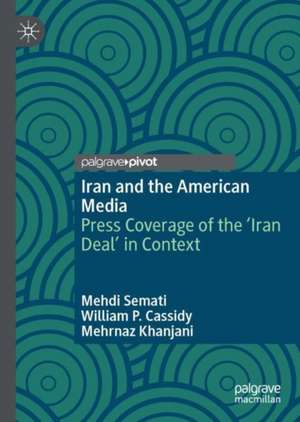Iran and the American Media: Press Coverage of the ‘Iran Deal’ in Context
Autor Mehdi Semati, William P. Cassidy, Mehrnaz Khanjanien Limba Engleză Hardback – 30 sep 2021
Preț: 450.88 lei
Nou
Puncte Express: 676
Preț estimativ în valută:
86.28€ • 90.26$ • 71.67£
86.28€ • 90.26$ • 71.67£
Carte tipărită la comandă
Livrare economică 03-17 aprilie
Preluare comenzi: 021 569.72.76
Specificații
ISBN-13: 9783030748999
ISBN-10: 3030748995
Pagini: 138
Ilustrații: X, 138 p.
Dimensiuni: 148 x 210 mm
Greutate: 0.33 kg
Ediția:1st ed. 2021
Editura: Springer International Publishing
Colecția Palgrave Macmillan
Locul publicării:Cham, Switzerland
ISBN-10: 3030748995
Pagini: 138
Ilustrații: X, 138 p.
Dimensiuni: 148 x 210 mm
Greutate: 0.33 kg
Ediția:1st ed. 2021
Editura: Springer International Publishing
Colecția Palgrave Macmillan
Locul publicării:Cham, Switzerland
Cuprins
Chapter 1:The Iran Deal in Context: American Press Coverage of Iran from Coup to the Islamic Republic .- Chapter 2: Theoretical Framework: Media Sociology, Indexing, Source Usage and Framing.- Chapter 3: Who Speaks in the Coverage of the Iran Deal in The New York Times and The Washington Post.- Chapter 4: Who Speaks in the Broadcast News Coverage of the Iran Deal.- Chapter 5: Iran in the American Cultural and Political Imagination.
Notă biografică
Mehdi Semati is Professor and Chair in the Department of Communication at Northern Illinois University, USA.
William P. Cassidy is Professor in the Department of Communication at Northern Illinois University, USA.
Mehrnaz Khanjani is a Ph.D. candidate in the School of Journalism and Mass Communication at the University of Iowa, USA.
William P. Cassidy is Professor in the Department of Communication at Northern Illinois University, USA.
Mehrnaz Khanjani is a Ph.D. candidate in the School of Journalism and Mass Communication at the University of Iowa, USA.
Textul de pe ultima copertă
"Iran and the American Media examines many ways that media coverage has brought Iran so deeply within America’s political and cultural consciousness. For media entities this has been an often difficult process in terms of sustaining objectivity and reflecting complexity. These authors perform a valuable service by addressing a wide range of media-related topics about one of the most challenging international relations issues of recent decades."
— Philip Seib, Professor of Journalism and Public Diplomacy, International Relations, University of Southern California, USA
"By closely examining the coverage of the so-called Iran Deal, the authors of this careful work skillfully reveal how the major US media's treatment of the agreement uncritically reproduce, rather than judiciously scrutinize, official and popular narratives that frame Iran as untrustworthy in negotiation, regionally malign, and hence deserving of discipline and punishment. Using information from thousands of news reports, the authors also convincingly show how, through their reliance on a limited set of domestic and foreign expert opinions, major news outlets perpetuate the notion that only a narrow range of policy choices is available to US policymakers."
— Farideh Farhi, Independent scholar, Comparative Politics, Iran’s Contemporary Politics and Foreign Policy, USA
This book investigates the American media coverage of the nuclear “Iran Deal” by examining the sources of news and opinion about it in The New York Times, The Washington Post and broadcast news. The empirical component uses media sociology and indexing theory to determine the extent to which the media covered the topic within a framework of debates among institutional sources. The coverage is placed within historical and interpretative frameworks that examine the construction of Iran in both the news and American popularculture to reveal the place Iran occupies in the American political and cultural imagination.
Mehdi Semati is Professor and Chair in the Department of Communication at Northern Illinois University, USA.
William P. Cassidy is Professor in the Department of Communication at Northern Illinois University, USA.
Mehrnaz Khanjani is a Ph.D. candidate in the School of Journalism and Mass Communication at the University of Iowa, USA.
— Philip Seib, Professor of Journalism and Public Diplomacy, International Relations, University of Southern California, USA
"By closely examining the coverage of the so-called Iran Deal, the authors of this careful work skillfully reveal how the major US media's treatment of the agreement uncritically reproduce, rather than judiciously scrutinize, official and popular narratives that frame Iran as untrustworthy in negotiation, regionally malign, and hence deserving of discipline and punishment. Using information from thousands of news reports, the authors also convincingly show how, through their reliance on a limited set of domestic and foreign expert opinions, major news outlets perpetuate the notion that only a narrow range of policy choices is available to US policymakers."
— Farideh Farhi, Independent scholar, Comparative Politics, Iran’s Contemporary Politics and Foreign Policy, USA
This book investigates the American media coverage of the nuclear “Iran Deal” by examining the sources of news and opinion about it in The New York Times, The Washington Post and broadcast news. The empirical component uses media sociology and indexing theory to determine the extent to which the media covered the topic within a framework of debates among institutional sources. The coverage is placed within historical and interpretative frameworks that examine the construction of Iran in both the news and American popularculture to reveal the place Iran occupies in the American political and cultural imagination.
Mehdi Semati is Professor and Chair in the Department of Communication at Northern Illinois University, USA.
William P. Cassidy is Professor in the Department of Communication at Northern Illinois University, USA.
Mehrnaz Khanjani is a Ph.D. candidate in the School of Journalism and Mass Communication at the University of Iowa, USA.
Caracteristici
Holds interdisciplinary appeal to scholars of media, International Relations, Middle Eastern studies and many more Addresses an ongoing and important geopolitical issue—the Iranian nuclear program Provides an accessible approach for a wide readership including policymakers, media professionals and journalists
